The other morning, I felt quite tender, “a walking nerve-ending,” as I often describe myself. One of those mornings after a restless night’s sleep where every part of me felt sensitive, my insides vibrating like a plucked guitar string.
My mom is in medical rehab for the second time this year, and though I have flown back to Chicago twice from the Northwest, helping my mom from afar is hard. While making my teenager’s school lunch that morning, a Medicare-assigned nurse texted me about a billing issue: my mom’s primary care doctor’s appointment wouldn’t be covered because my mom attended “by phone,” not on video conference or in-person.
“How does Medicare expect an elderly woman to go to a doctor’s office when she can barely walk or use technology she can’t access very well?” I texted back, likely with an angry face emoji.
But when I called my 87-year old mom to tell her the news—even though I had been in the room just a month prior when she was on the phone with her doctor—she remembered the call was actually on FaceTime. I had seen the doctor’s face (telling my mom she should no longer live alone) and had already forgotten that fact! I shook my head at the steel trap that is my mother’s mind, and called the doctor’s office to have them correct their billing. I texted the nurse again who said it was her “honor” to look out for my mom, and I burst into tears in a perfect storm of U.S. medical system frustration and gratitude for human kindness.
I managed to pull myself together enough to drive my daughter to school, then go run an errand at the store, but as I walked back to my car, so many other things burdened my thoughts—my again-shifting career, my own personal health (and health insurance), and my love for my teenage daughter who rolls her eyes at me. My spouse and I are really in the crush of the “sandwich generation” right now, which exacerbates pressure and stress. I cried again when I got back into my car. I was a mess. I needed to get grounded. I drove to a nearby trailhead to be in nature.
Many people call grief a portal. Others say grief that comes with helping elderly parents, in-laws included, is called “anticipatory grief.” Well, most of my grief feels quite present and I find new portals every day. I feel grief about our US systems such as a healthcare, which forces most people to tie their insurance to employment or pay premiums with exorbitant deductibles. I feel grief from increasing houselessness, death tolls, and acts of public violence while erosion of our public education and book banning continues. Grief at rising fascism, Christian Nationalism, corporate greed, and the incredible wealth inequality that has risen exponentially in my generation (#GenX forever & ever, amen.) My body is strong and can hold in my cells loads of stuff; but holding in grief is not healthy and, the older I get, becomes increasingly untenable. Therefore, I work on my daily practices (yes, daily) to feel my grief, let it go, and re-center when I lose my center like I did the other morning.
To the outsider, my daily practices might seem like I’m on the verge of insanity. Besides crying a-plenty, at home, I also regularly get up from my desk and shake out my whole body, do EFT tapping, lymphatic drainage on my head and neck, lay down and pet my cat, and sing and dance or hula-hoop poorly to a good song, (which lately is “Homesick” by Noah Kahan on loop). I force myself to rest, to do nothing more than read a book, color in a journal, and nap. And then, yes, I walk in nature a lot and say hello aloud to the beings I find there. On my hike that day, I talked to Oregon juncos and brown creepers, a chortling winter wren and spotted towhees, a doe and her fawn who surprised me crossing the trail.
Some people throw around the word resiliency, a word I never liked because when I worked in violence-prevention social services, public officials often talked about the kids who’d suffered untold abuses as “resilient.” From my point of view of working directly with the kids, I thought they were forced to grow up too fast and too furiously with too much coming at them (one definition of trauma)—and though I marveled at their basic functionality, I always simply wished they didn’t have to go through what they went through. That work made me more committed to changing systems that perpetuated the allowance of the abuse.
Yet, personal grief held inside is a energy tamper-zapper-downer; resiliency in somatic practices means to find our aliveness again.
Aliveness does not have to mean productive to the greater society; it could mean productive for our health, i.e. productively feeling our grief. When I had my first bout of Covid starting on Labor Day right after coming home from my Chicago visit (no coincidence), my illness wasn’t too bad, thankfully, but Covid made me slow down. I recalled a graduate school professor telling me, when I took a whole semester to read Moby Dick, “who said there’s value in going fast?” During Covid, I started reading an 800-page book by my favorite author, which will take me months to read. I rested in bed and thought of friends who are experiencing Long Covid, how grief often manifests as illness stuck in the lungs, and how we are all in a grieving period, sandwich generation or not, that perhaps should be named Long Grief, because grieving together in these times may be a way we all connect and communicate.
Down in the canyon, I felt in my lungs lingering with the effects of the virus and I slowed my steps again, hoping to find my resiliency in slowness, my value. I spotted a snail, who curled up into its shell and hid, then slowly came out again to munch on some lichen. In the middle of the canyon loop, I spotted another portal-looking tree, functioning as a nurse to many new shoots, and I saw a little mushroom, which made me wonder about the mycelium underground connecting tree roots to each other. By the time I finished the last rise of the canyon loop, I felt more centered, ready to come home to write and work.
But then, I realized, I didn’t have my lavender hat. The hat I wore because it was cool and wet that morning, but that I stuck in my pocket after being startled by the leaping deer. I stood on the trail and looked both ways, the trailhead was another three-quarters of a mile up, the trail loop I’d just walked was a mile and a half or so down and around. Would I have to walk the loop again? Did I drop the hat closer to where the deer had been? I was already so feeling lingering post-Covid fatigue. I did not want to hike more. But, my daughter made me that hat. I had to go find it. My lifted mood soured again, this time with a little more heat and anger. I walked up to the deer spot to find nothing, then turned around and faced the loop again.
I stomped down the trail, muttering aloud my resentments about Alex Steffen’s concept of “ruggedization” and the 75 Hard Challenge a friend is doing for development of mental toughness. But I kept walking, past the snail spot, past the mushroom, down into the dark forest, again. About halfway through, the physical exertion turned into something else, not toughness or ruggedness, but acceptance of my grieving self and nerve-ending tenderness. I didn’t fully connect the dots until I sat down to write this post, but I have realized my sensitivity is not unlike the angel-hair threads of mycelium underground that make trees communicate with each other. What am I doing here on Substack or any writing medium other than communication? I’ve always been so hard on myself about my sensitivity, but now I realize, my nerve-endingness actually makes the connections, builds community, and networks with other humans, tree-like as we may be sometimes. My vibrating nerve strings contribute to my toughness, ruggedness, and resiliency.
At the second tree portal, the second time around, I found the damn hat. I finished the hike again and in the process, recommitted more radically to daily somatic practices. Radical, after all, as Angela Davis tells us, is all about getting to the roots. May we continue to communicate and connect; well-grounded, together, and underground.
Here’s a lavender-heart-patched hats off to finding your resiliency today. Thanks for reading.
P.S. If you want to read more from me about the messiness of embodying healing through somatic practices, you can click the Clackamas Arts Alliance writing contest awards page, and download the contest winners. My essay, “Mothering in the Time of Fire and Ice,” begins on page 46.




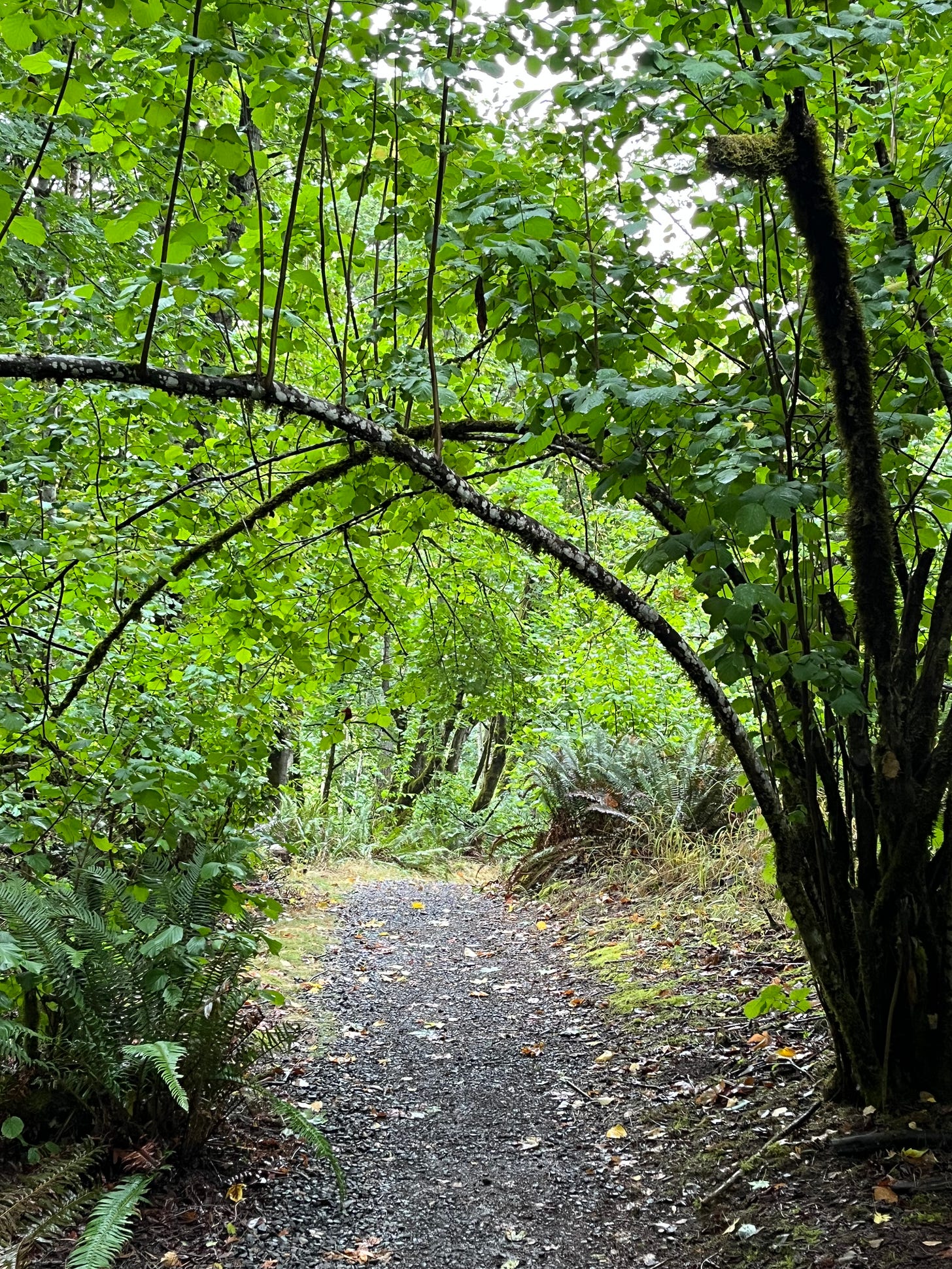
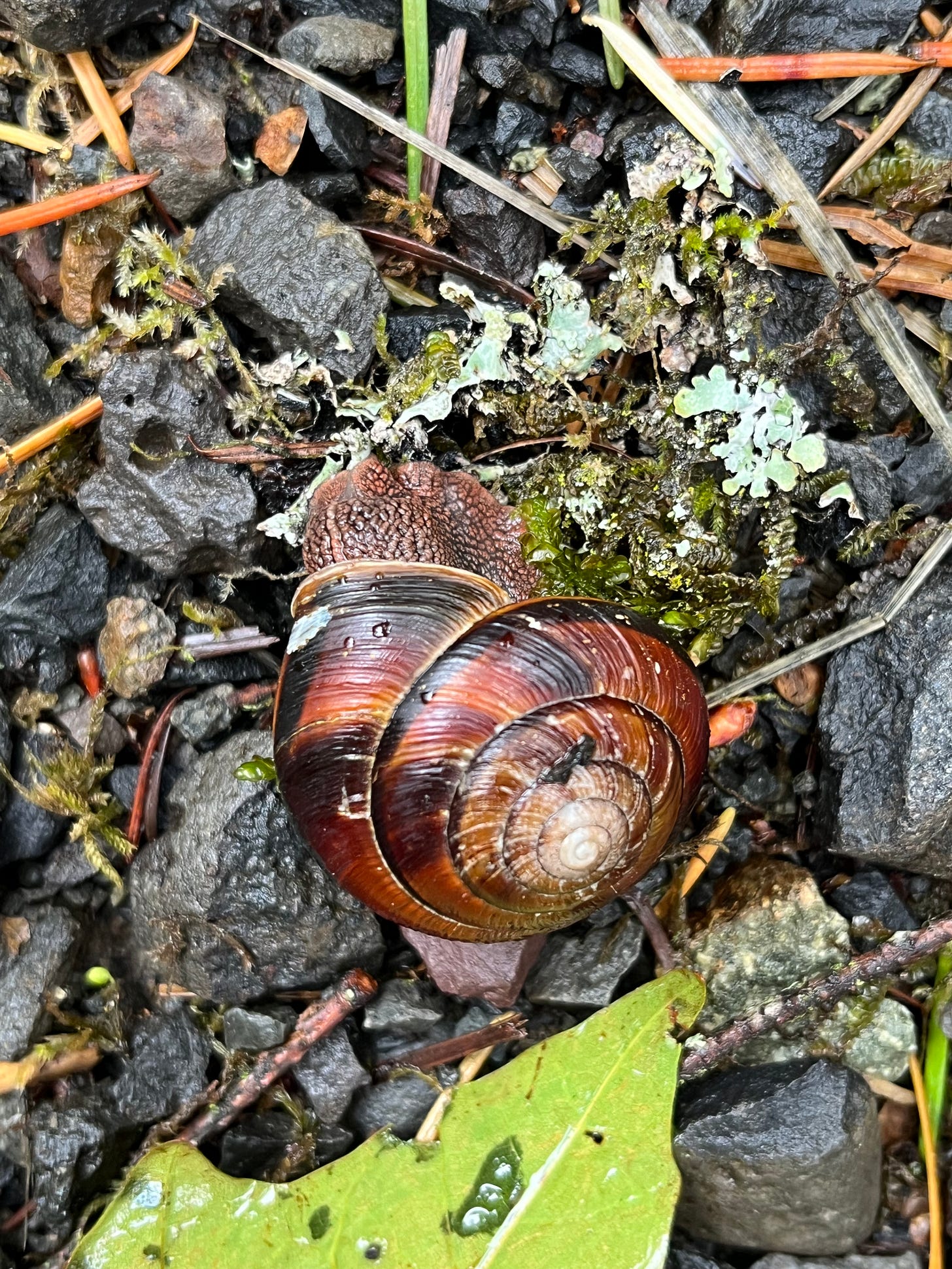
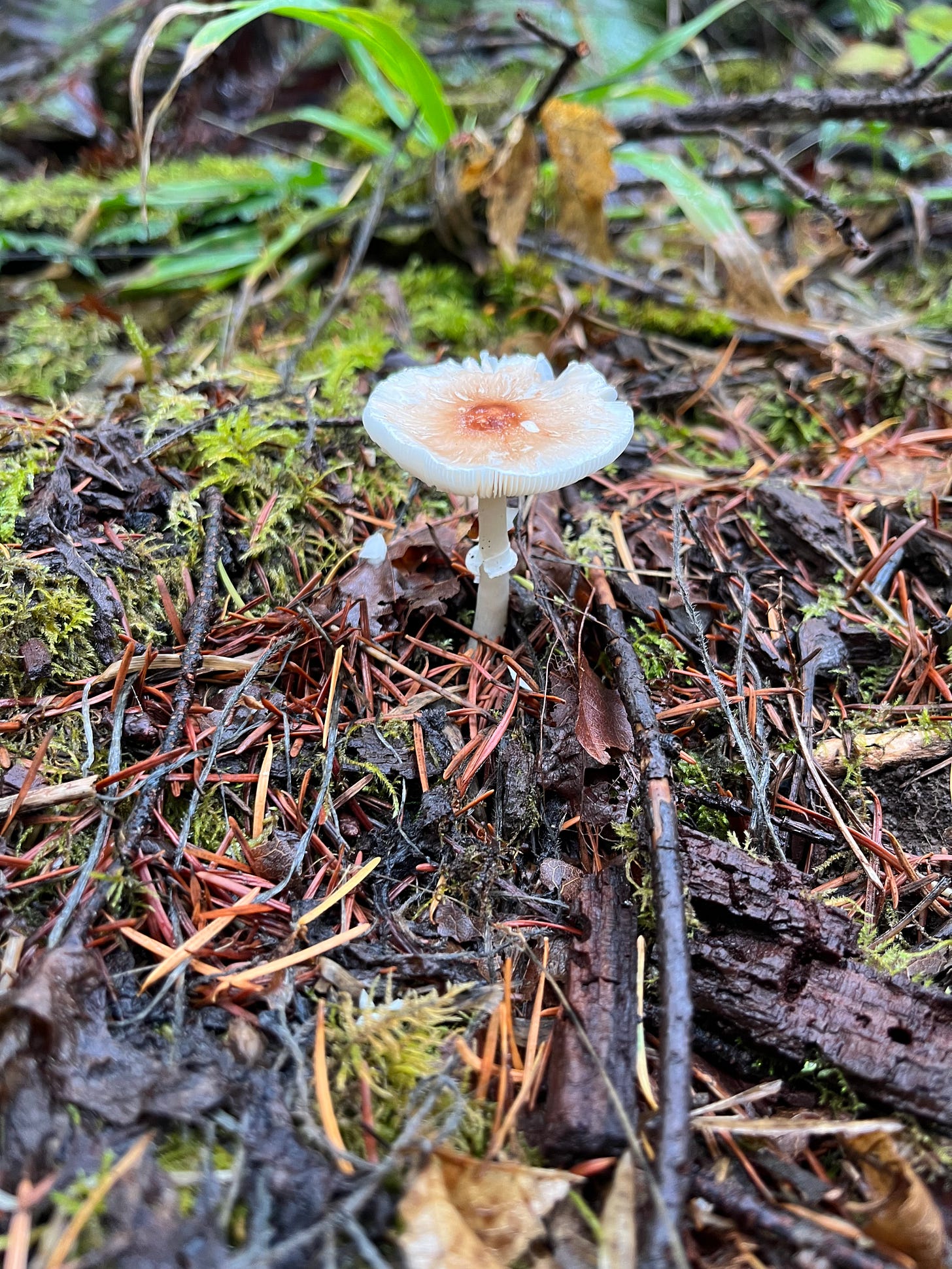
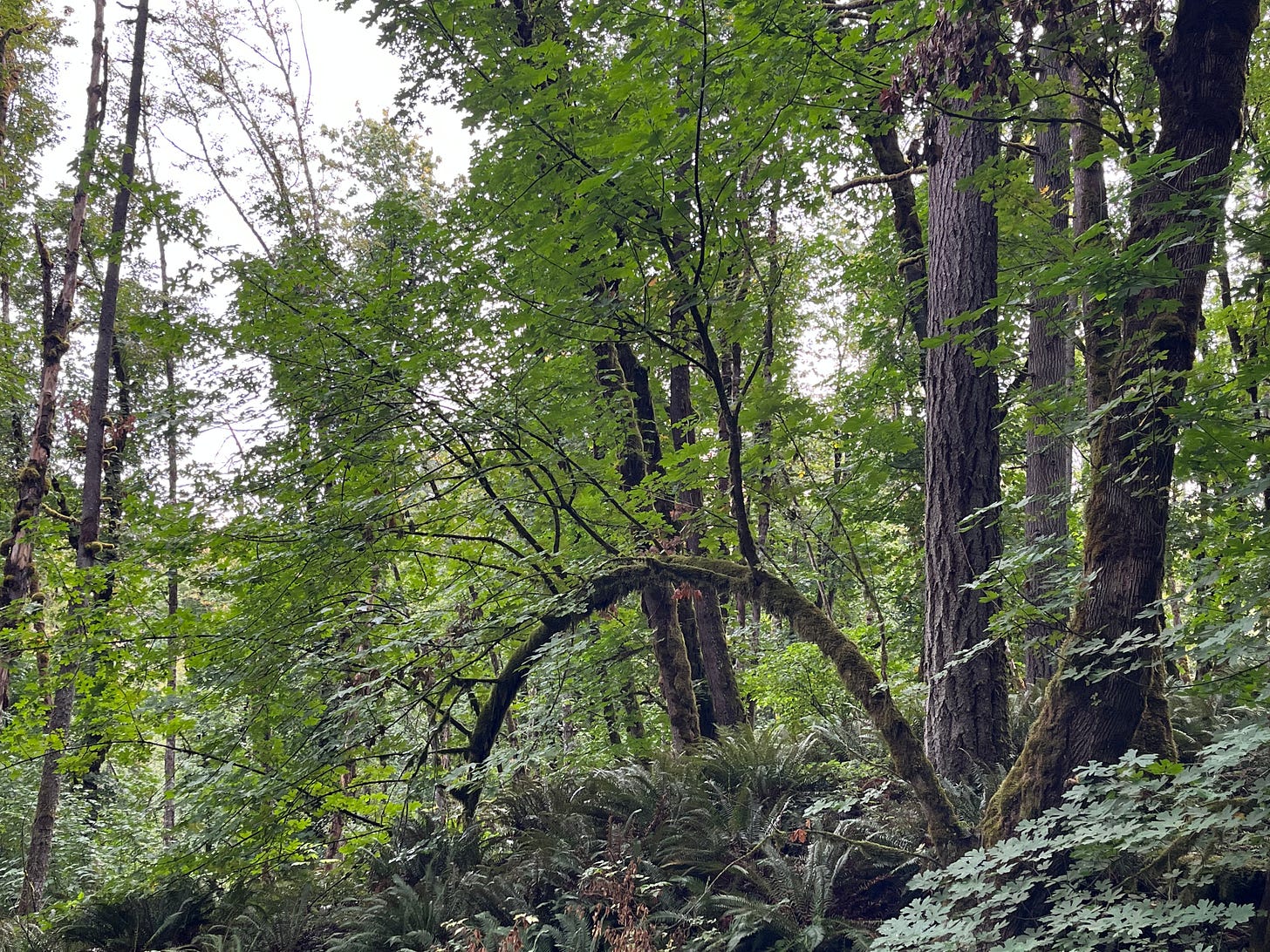
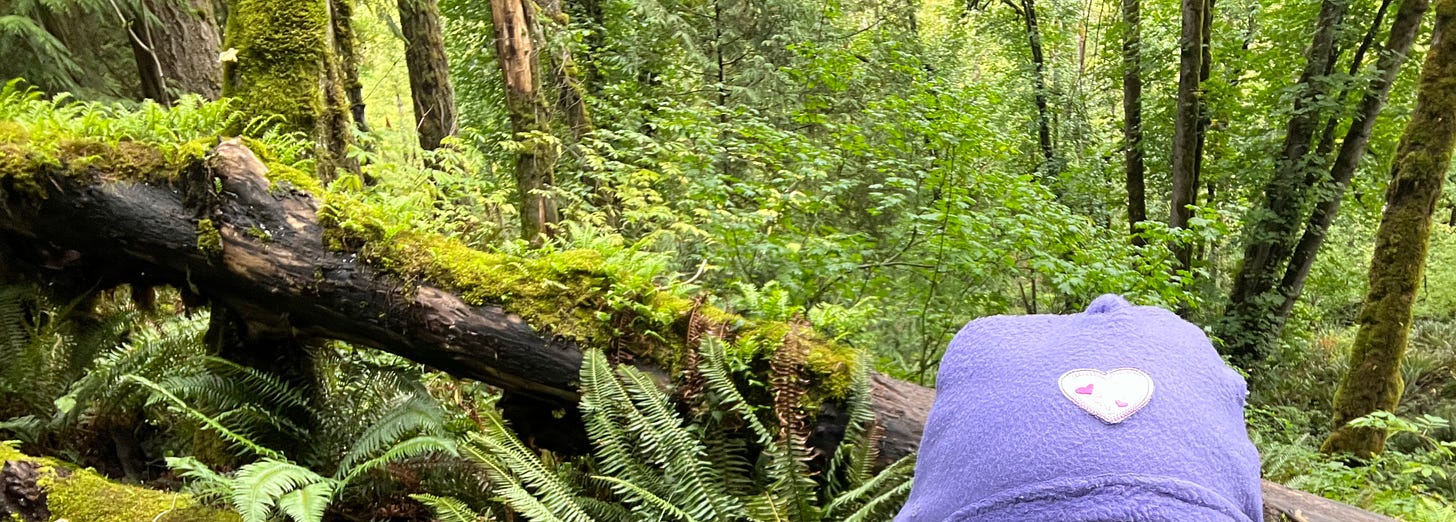
Love you 😘 I liked the concept of
Long grief… makes a ton of sense… and the simile to long
Covid…
Your writing, content & rawness is so meaningful to read. You’re incredible💜